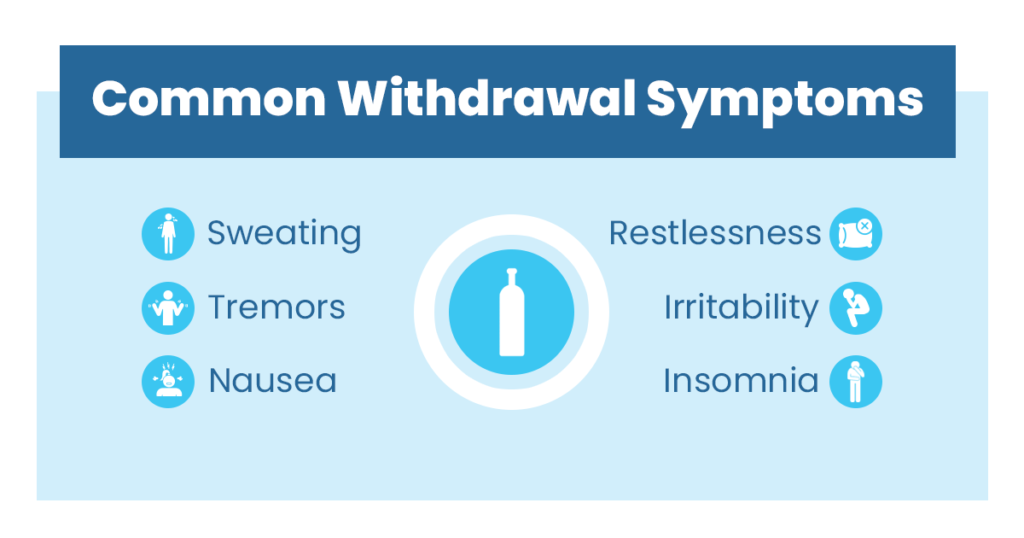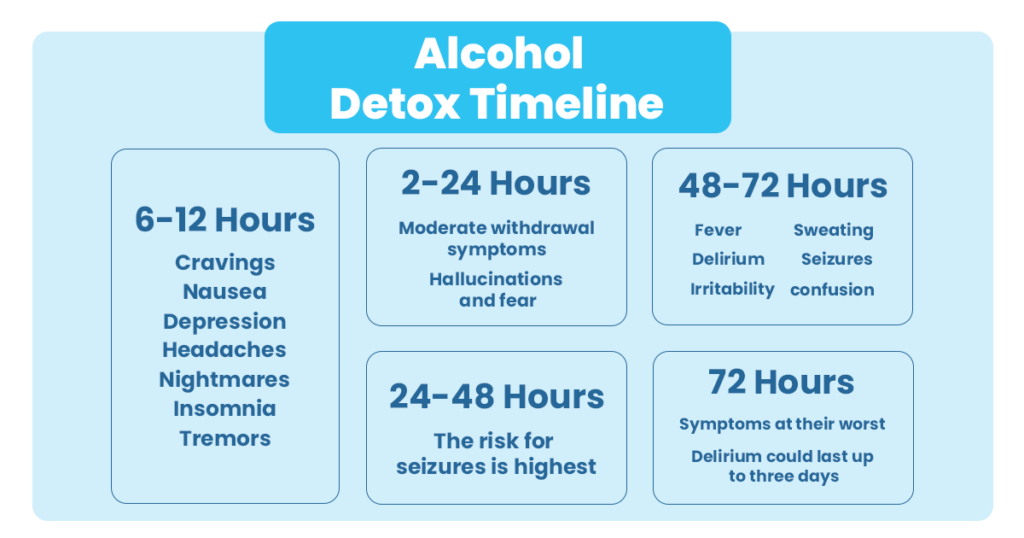
Not drinking can be difficult for someone dependent on alcohol. When a person stops drinking and the alcohol begins to leave their system, they go through alcohol detoxification. But, exactly how long does the detox process last?
Age, gender, health, genetics, and alcohol use history are just a few variables that affect how long it takes for alcohol to completely leave your bloodstream. Alcohol withdrawal typically starts eight hours after the last drink, but it can sometimes take several days to start, according to the National Library of Medicine.
The majority of the time, the symptoms peak between 24 and 72 hours, but some may last many weeks. Even after alcohol has been removed from your bloodstream, tests for its presence in your urine, saliva, and hair can still result in positives.
Alcohol detoxification is the first step in the treatment of alcoholism. In this period, all traces of alcohol are eliminated from the system. After beginning detox, withdrawal symptoms show and typically subside within one to two weeks; however, this could take longer depending on the severity of your alcohol use disorder (AUD). After that point, you will be able to concentrate on other aspects of the recovery process, including activities like therapy, counseling, and support groups.
Alcohol Detox Timeline
Everyone’s alcohol detox process takes a different amount of time, but it follows a common timeline for most moderate to heavy drinkers:
6 to 12 Hours
The onset of mild withdrawal symptoms typically occurs six hours after a person with a substance use disorder has their last drink. Cravings are one of the first symptoms a person will experience. During this time, they may also experience nausea, gastrointestinal distress, loss of appetite, depression, headaches, nightmares, insomnia, and tremors.
Individuals with a long history of heavy alcohol consumption may experience seizures after six hours. Seizures are the most dangerous of the acute alcohol withdrawal symptoms, according to medical professionals.
12 to 24 Hours
You will begin to experience moderate withdrawal symptoms after 12 hours. During alcohol withdrawal, 2 to 8 percent of people experience hallucinations, according to research. They may see or hear things that aren’t physically present and experience fear, but this is not considered a serious complication by doctors. For people experiencing minor withdrawal, these symptoms typically peak between 18 and 24 hours and subside within four to five days.
24 to 48 Hours
People will typically continue to experience mild to moderate withdrawal symptoms during this period. This is the time when the risk of having a seizure is highest, and it can remain a severe risk for several days. Seizures can be mild or life-threatening.
48 to 72 Hours
People may experience more severe withdrawal symptoms after 48 hours. Alcohol withdrawal delirium, also known as delirium tremens (DT), can occur in some people. Alcohol withdrawal of this severity can result in body tremors, irritability, sweating, extreme confusion, swift mood changes, hallucinations, fever, increased heart rate, and seizures.
Chest pain can also develop as a result of an increase in blood pressure. Most of the time, after 48 hours, the risk of seizures decreases while the risk of heart attack and stroke rises. Due to the high mortality rate of DT, it is typically managed and cared for in an intensive care unit of a facility with medical supervision, sedative medications, and nurse assistance.
72 Hours and After
During this time period, alcohol withdrawal symptoms are typically at their worst for the individual. Delirium tremens may last two to three days, but it can persist beyond eight days and lead to death if not monitored and managed by a medical professional. If symptoms are severe, it is imperative to seek medical attention immediately.
Factors Influencing Alcohol Detox Time
The duration of alcohol detox varies based on severity of the drinking pattern, the health of the individual, and the history of alcohol abuse.
Severity of Drinking
People with more severe alcohol use disorders tend to experience more serious and prolonged withdrawal symptoms. The amount of alcohol a person consumes will determine the duration of their detox and withdrawal.
Long-term binge drinking and excessive drinking can worsen withdrawal symptoms. In most cases, severe withdrawal symptoms indicate a longer detox period.
Age, Weight, And Health
In general, detox will happen faster the younger and healthier a person is. People who already have health issues, such as liver issues, may experience a more difficult and protracted detox process.
On average, older people go through a longer detox. Advanced age causes the body to process substances more slowly. People who are obese may take longer to detox as well because the body stores alcohol in fat.
Time Abusing Alcohol
The length of a person’s alcoholism can affect the duration of their detox process. Even moderate alcohol consumption over an extended period may result in withdrawal.
People who have been heavy drinkers for an extended period of time may experience prolonged alcohol withdrawal syndrome.

Frequently Asked Questions (FAQs)
How long does it take to detox your body?
The process of detoxing from alcohol or drugs involves eliminating harmful substances from the body while managing withdrawal symptoms. Normally, detoxification takes three to 10 days. Detoxification can, however, be longer and up to many weeks or even months for more serious addictions.
How long does it take for your body to get back to normal after alcoholism?
In most cases, the full damage caused by chronic and heavy alcohol use is not fully resolved. Typically, reversal of damage occurs quickly in the first few months to a year of abstinence and then slows down.
What can I expect after stopping drinking?
You will experience withdrawal symptoms once you stop drinking. Withdrawal symptoms can include sweating, tremors, sleep problems, rapid heartbeat, nausea and vomiting, hallucinations, anxiety, restlessness, and possibly even seizures.
What happens in an alcohol detox?
Detoxification is the first step in treating alcoholism. Using a variety of detoxification substances, alcohol is entirely eliminated from your body throughout this process.
After beginning detox, withdrawal symptoms normally lessen after a week or two; however, this may take longer depending on the intensity of the addiction. You can then focus on other rehabilitation procedures, such as other treatments, counseling sessions, and support options.
Get Your Life Back through The Haven Detox-New England
Your life is worth saving, and you can get through the detox process safely and quickly. Detoxification can span anywhere from a few days to a few months, and it is essential to have the necessary assistance to get the best outcomes while avoiding life-threatening complications.
The Haven Detox-New England develops individualized treatment plans and provides continuous support. Whether you require outpatient therapy or inpatient treatment, our experts assist you in overcoming alcoholism and getting your life back from addiction.
Take the first step to begin your recovery journey by contacting us at (844) 933-4145 today.



